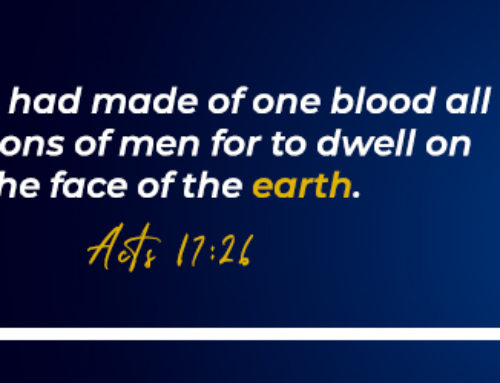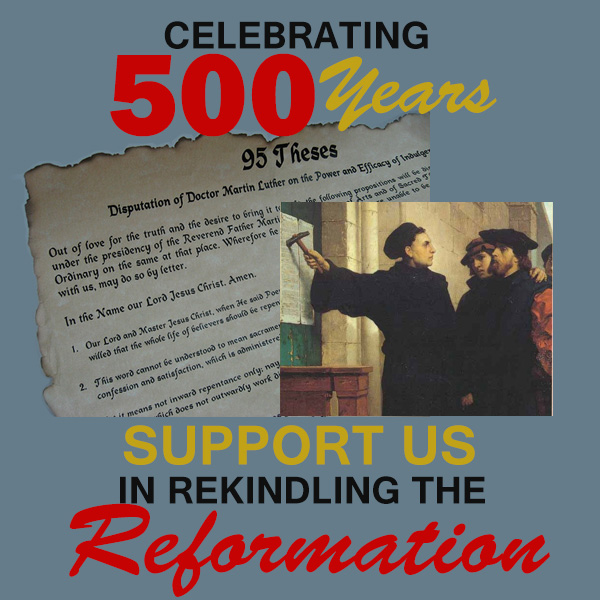But who is this ‘Us’? Jesus answers. In His last recorded prayer, He prayed to His Father, “That they all may be one; as thou, Father, art in me, and I in thee, that they also may be one in Us: that the world may believe that thou hast sent me” (John 17:21). Ironically, this very passage of Scripture is used by the ecumenical movement to justify all religions coming together, thereby abandoning the distinctive points their faith.
And what is the image of God in which He made man? Moses again reveals to us, “And the Lord passed by before him, and proclaimed, The Lord, The Lord God, merciful and gracious, long-suffering, and abundant in goodness and truth” (Exodus 34:6). The Psalmist David agrees. He educates us, “The Lord is merciful and gracious, slow to anger, and plenteous in mercy (Psalm 103:8). The Bible is replete with this image of God. It is verily His character. It is the image in which man was created.
But something happened that caused man to lose that character. The Bible calls it sin. It is thus described, “Whosoever committeth sin transgresseth also the law: for sin is the transgression of the law” (1 John 3:4). God’s law is the reflection of His character of righteousness and His standard by which He requires all humanity to live. David again admonishes us, “Thy righteousness is an everlasting righteousness, and thy law is the truth… My tongue shall speak of thy word: for all thy commandments are righteousness” (Psalm 119:142,172).
Beginning with the first created humans to the very day in which we live, none, except Jesus Christ, has been able to perfectly keep His law, and thus fully reflecting His character. Therefore, the Apostle Paul was able to conclude, “For all have sinned, and come short of the glory of God” (Romans 3:23). His glory here referred to is His character. Jesus explains, “And now, O Father, glorify thou me with thine own self with the glory which I had with thee before the world was” (John 17:5). When Moses asked God to show him his glory, He [God] proclaimed to Moses His graciousness and goodness (Exodus 33:18-19).
Because of God’s love, graciousness, goodness, and mercy; verily because of who He is, Jesus exclaimed, “For God so loved the world, that he gave his only begotten Son, that whosoever believeth in him should not perish, but have everlasting life” (John 3:16). In other words, through Jesus Christ, and Him alone, can the image of God be restored to man. This is the only true salvation. The angel announced to Joseph, the earthly father of Jesus Christ, “And she shall bring forth a son, and thou shalt call his name Jesus: for he shall save his people from their sins. Now all this was done, that it might be fulfilled which was spoken of the Lord by the prophet, saying, Behold, a virgin shall be with child, and shall bring forth a son, and they shall call his name Emmanuel, which being interpreted is, God with us” (Matthew 1:21-23).
More than six hundred years earlier, the prophet Isaiah, under the power and inspiration of the Holy Spirit, had prophesied of that event. Not only had he told of Jesus’ coming; but he prophesied the manner in which He would arrive. Isaiah assured his countrymen, “Therefore the Lord himself shall give you a sign; Behold, a virgin shall conceive, and bear a son, and shall call his name Immanuel” (Isaiah 7:14). Further, Isaiah was also able to predict with divine accuracy, the work Jesus was to perform. The prophet declared, “For unto us a child is born, unto us a son is given: and the government shall be upon his shoulder: and his name shall be called Wonderful, Counsellor, The mighty God, The everlasting Father, The Prince of Peace “(Isaiah 9:6). He then gave clearer definition of Jesus’ mission to ransom and reunite the human family with Himself and his Father. Isaiah painfully counseled the nation, “He is despised and rejected of men; a man of sorrows, and acquainted with grief: and we hid as it were our faces from him; he was despised, and we esteemed him not. Surely he hath borne our griefs, and carried our sorrows: yet we did esteem him stricken, smitten of God, and afflicted. But he was wounded for our transgressions, he was bruised for our iniquities: the chastisement of our peace was upon him; and with his stripes we are healed” (Isaiah 53:3-5).
Likewise, the prophet Micah was called by God to give a stern message to of judgement to his countrymen in Jerusalem. Micah did not flinch from rebuking the apostasy of his countrymen who were oppressing the poor and abusing those less fortunate. He warned them of God’s judgement to come, then held out God’s promise of restoration by sending the promised Messiah. He assured them, “But thou, Bethlehem Ephratah, though thou be little among the thousands of Judah, yet out of thee shall he come forth unto me that is to be ruler in Israel; whose goings forth have been from of old, from everlasting” (Micah 5:2). Not only did Micah prophesied of the exact place of Jesus’ birth; but he verily declared that He was from everlasting.
Interestingly, Jesus’ parents did not live in Bethlehem. Nazareth, a small insignificant village some 90 miles away was their residence. His mother Mary was nine months pregnant with her baby Jesus. The Roman Emperor, Caesar Augustus, decreed that all in the empire should be taxed. In order to be taxed, each family had to travel to the city of their lineage according to their tribe. Being of the tribe of Judah and lineage of David, the residents of Nazareth, including Joseph and Mary, had to make the journey to Bethlehem, the city of David. It was at the end of that journey, just as was prophesied by Micah, Jesus was born in Bethlehem. The angels announced to the shepherds, “Fear not: for, behold, I bring you good tidings of great joy, which shall be to all people. For unto you is born this day in the city of David a Saviour, which is Christ the Lord” (Luke 2:10-11).
In addition to accurately prophesying the time, place, and manner of His birth, the ancient seers also precisely foretold the time He would begin His earthly ministry, when it would end and the time He would die. The prophet Daniel, while in Babylonian captivity some six hundred years before His birth, gave this strikingly detailed account of those events. He related, “Seventy weeks are determined upon thy people and upon thy holy city, to finish the transgression, and to make an end of sins, and to make reconciliation for iniquity, and to bring in everlasting righteousness, and to seal up the vision and prophecy, and to anoint the most Holy. Know therefore and understand, that from the going forth of the commandment to restore and to build Jerusalem unto the Messiah the Prince shall be seven weeks, and threescore and two weeks: the street shall be built again, and the wall, even in troublous times. And after threescore and two weeks shall Messiah be cut off, but not for himself” (Daniel 9:24-26). As Jesus began His ministry, speaking in the Synagogue in His hometown of Nazareth on the Sabbath-day, He declared, “The Spirit of the Lord is upon me, because he hath anointed me to preach the gospel to the poor; he hath sent me to heal the brokenhearted, to preach deliverance to the captives, and recovering of sight to the blind, to set at liberty them that are bruised, To preach the acceptable year of the Lord…This day is this scripture fulfilled in your ears” (Luke 4:18,19, 21).
So convincing is this revelation of who Jesus Christ really is, the promised Messiah and Only Savior of the world, that the leaders who rejected Him pronounced a curse on anyone who would study and understand this sacred truth. The curse reads, “May the bones of the fingers decay and decompose, of him who turns the pages of the Book of Daniel, to find out the time of Daniel (9:24-27), and may his memory rot from off the face of the earth forever” (Talmudic Law, page 978, section 2, line 28). Why should such a harsh pronouncement be necessary? Simply because this prophecy, above all others, prove beyond the shadow of any doubt that the Jesus whom they rejected and nailed to the cruel cross was none other than the Messiah whom they claimed to be looking forward to.
Despite such threatening declarations, there were those who not only recognized, but accepted Jesus Christ for who He truly is. John the Baptist, when asked by those very leaders that would eventually crucify the Savior, who he (John the Baptist) was, referred them to the writings of the seer Isaiah. He informed them, “He said, I am the voice of one crying in the wilderness, Make straight the way of the Lord, as said the prophet Esaias” (John 1:23, Isaiah 40:3).
Additionally, we have this historical account from one who was not a follower of Jesus; but nevertheless, obviously recognized Him for who He is. In Rome, in the year 93, Josephus published his lengthy history of the Jews. While discussing the period in which the Jews of Judaea were governed by the Roman procurator Pontius Pilate, Josephus included the following account: “About this time there lived Jesus, a wise man, if indeed one ought to call him a man. For he was one who performed surprising deeds and was a teacher of such people as accept the truth gladly. He won over many Jews and many of the Greeks. He was the Messiah. And when, upon the accusation of the principal men among us, Pilate had condemned him to a cross, those who had first come to love him did not cease. He appeared to them spending a third day restored to life, for the prophets of God had foretold these things and a thousand other marvels about him. And the tribe of the Christians, so called after him, has still to this day not disappeared” (Jewish Antiquities, 18.3.3 §63).
A modern day disciple observed; “Some skeptics have suggested that these prophecies were accidentally or coincidentally fulfilled by Jesus. According to the Science of Probability the chance of any one human being-up until the present-fulfilling a selection of just 8 of these prophecies (including the one on the crucifixion) is 1 in 10/17…And here we are considering only 8 prophecies. What if we were to consider 48 prophecies? The chance then becomes virtually zero. (1 in 10/157) (That’s like finding a particular grain of sand out of all the sand on earth and beneath the sea). What about all 61 prophecies? (Evidence that demands a verdict, Josh Mc Dowell).
Not only is Jesus the Messiah, the Only Savior of the world; but He is the Only Mediator and Intercessor between God and man. Contrary to the ever increasing doctrine that Mary, His mother, is co-mediator, the Bible declares differently. This teaching of Mary as mediator is central to the Roman Catholic church and is rapidly being promulgated to Christendom and to the world. But, the Apostle Paul informs us, “For there is one God, and one mediator between God and men, the man Christ Jesus (1 Timothy 2:5). He is our Only Hope for this sin-sick world.
So, who is this Jesus that died for you?
Answer: He is the Only One—the Only Savior of the world. He declared of Himself, “I am the way, the truth, and the life: no man cometh unto the Father, but by me” Learn more about the Savior.(John 14:6).









Leave A Comment